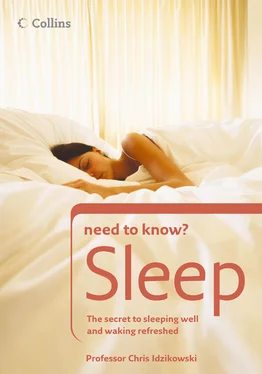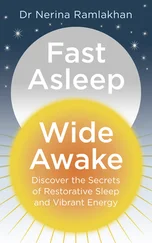Surveys show that 95 per cent of us will suffer from sleeping problems at some point in our lives, and insomnia is cited as one of the main reasons for visits to the doctor. But what is insomnia? And, more importantly, why do we get it? All too often the answer lies within. This chapter looks at the important roles that Nature, lifestyle and environment have to play.
Studies show that 50 per cent of us have symptoms of insomnia at any given time. We often use the word ‘insomnia’ when we miss one night’s sleep. But what does insomnia really mean?
In normal usage ‘insomnia’ just means not being able to sleep. The inability to sleep can be caused by literally anything. Sometimes people talk about insomnia when they have not given themselves enough time to sleep, but when considered by a sleep disorder specialist, insomnia is often just regarded as a symptom and a cause is sought, e.g. depression (see page 156). Nowadays a sleep disorder specialist may regard insomnia as a disorder in its own right with very specific sleep-related causes (see pages 127-31). The changes in the usage of the word can cause confusion (particularly when surveys are conducted). An outdated classification simply described three types:
• Insomnia is the most common mental health problem in the UK.
• One in ten people will suffer from chronic insomnia at some point in their lives.
• Transient insomnia– short-term sleeping problems (usually lasting only a few days). Often caused by one-off changes in your sleep cycle, such as long-distance travel and jet lag, or illness. This is by far the most common type, and accounts for about 75 per cent of all cases of insomnia.
• Short-term insomnia– sleeping problems caused by a more prolonged period of stress, due to, say, financial problems or marital break-up. This can last for weeks.
• Chronic insomnia– the often inevitable result of untreated short-term insomnia. It can last for months, and, in rare cases, years. It is a long-term problem that often recurs.
Sleeplessness and insomnia
It may be better to use two words: ‘sleeplessness’ for the times that sleep is impossible, but you know why; and ‘insomnia’ for the times that you do not know why you cannot sleep. Some reasons for sleeplessness include:
• lifestyle (work, shifts, caring for an invalid, children)
• poor sleeping environment (noise, uncomfortable mattress, etc.)
• stress (bereavement, divorce, etc.)
• a poor diet
• stimulants, medicines and drugs
Using sleeping pills
Prescription of sleeping pills costs the UK about £22.4 million per year. About 15.5 million prescriptions are written. Taking sleeping pills has been shown to increase the risk of road accidents (last year there were 32,220 serious injuries and deaths on UK roads).
As a general rule, a good way to find out if you have true insomnia is to ask yourself if there is any obvious reason for your sleeping problems. If not, and you have had the problem for a few weeks, then you are likely to be suffering from the condition.
Insomnia can develop from sleeplessness, and often patients will know when their sleep problems started but cannot understand why they have not gone away. Psychiatrists rarely diagnose insomnia but when they do the following conditions must be met:
• The time it takes to get to sleep must be more than 30 minutes. Total sleep time during the night is usually between three to six hours. The sleep may be unrefreshing.
• The problem must occur three or more nights a week.
• The insomnia causes major problems in daytime functioning (socially, at home, at work).
• It must have lasted for three months or longer.
• There are no environmental, lifestyle, medical or psychiatric causes for the problem.
Understanding when our bodies are working against us can sometimes be half the battle when trying to understand why we can’t sleep. Here are some of the natural factors that can affect sleep.
Women and sleeping
Polls carried out in the USA by the National Sleep Foundation found the following:
• Almost three out of four women get less than eight hours’ sleep a night.
• Sleep is disturbed for 2.5 days on average during the menstrual cycle.
• More women complain of sleep problems during menstruation (71 per cent) than during the week preceding menstruation (43 per cent).
• Sleep-disrupting conditions such as anxiety and depression are twice as likely to occur in women than in men.
It is a sad fact of life that you are more likely to have sleep problems if you are a woman. The reason for this is partly due to the female bodily cycles. Much of women’s lives is governed by the sex hormones oestrogen and progesterone, and hormonal fluctuations, as in the menstrual cycle, pregnancy and the menopause, can severely affect sleep either directly, or through their effects on anxiety and general mood. Pre-menstrual women commonly report sleeping difficulties in the week before their period starts, but even women who don’t suffer from pre-menstrual symptoms can still take longer to fall asleep, wake more often and feel less refreshed after sleep during the second phase of their cycles. Sleep disturbances also become more common during the menopause, when women report waking up more often at night and feeling more tired during the day.
Studies on the effects on sleep of Hormone Replacement Therapy (HRT) and oral contraceptives have shown that these hormones have direct effects on the brain. Oestrogen has widespread effects on mental performance, mood, movement coordination and pain. However, the monthly fluctuation of oestrogen and progesterone impacts on cognitive function, mood, appetite and temperature, as well as the sexual organs and breasts, making it more difficult to work out how they affect sleep directly.
There is evidence to suggest that women’s role in society may affect their sleep even more than hormonal changes. The added pressures many women face of juggling stressful jobs with their roles as mothers and wives can often pose an intolerable burden, exacerbated by the fact that many women ignore their fatigue.
Ageing can greatly affect sleep, with the number of hours declining as you get older. While a young adult will sleep on average for 7-8 hours, by old age this will go down to about six. Quality of sleep is affected too. Stage 4 sleep is reduced, and the proportion of REM sleep, which makes up abut 50 per cent of baby sleep, will, in the latter stages of life, go down to 15-20 per cent. Although the cause may be inevitable, there are still steps you can take to improve the situation (see Chapter 4).
Your sleep is more likely to be poor if your general health is poor, even if you are not suffering from a specifically sleep-related disorder (see Chapter 6). Conditions such as heart disease, general breathing problems and arthritis can make it difficult to get comfortable at night, and will almost certainly have an impact on your sleep. Consult your doctor if this becomes an issue. For many people emotional issues and character make-up may come into play.
Читать дальше












